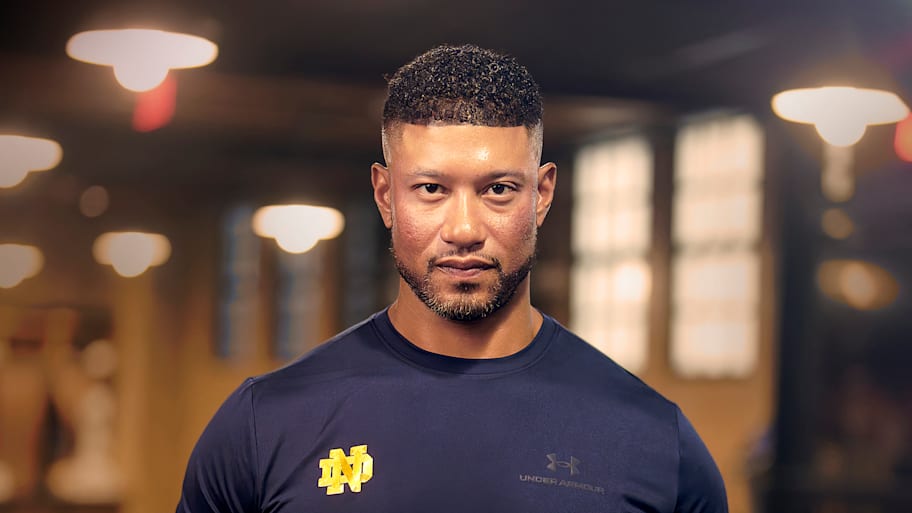A jumbo pack of Trident Vibes chewing gum sits on the floor in the back seat of Marcus Freeman’s Escalade, evidence of a commitment to keeping his breath minty fresh at all times. When you see someone every 10 feet on the Notre Dame campus wanting to interact with you, this is important. The coach of the Fighting Irish can’t walk around blowing stale breath on the public, can he?
Small courtesies such as this might not have been top of mind for Freeman’s predecessor.
Brian Kelly was less concerned with agreeable interactions in South Bend, bringing more of a salty demeanor to his job than the current coach’s sugar. Freeman is being paid more than $9 million a year with the same imperative to win that has always existed at Notre Dame, but doing so with an element of inclusive charm is the goal. His mother, Chong, an exemplar of mindful manners, wouldn’t want it any other way.
So Freeman waves to those who hail him, flashes his flawless smile for picture seekers and exchanges small talk with maintenance workers in a halitosis-free environment. Wearing a navy dry-fit shirt, gray pants and pristine white Under Armour sneakers, the 39-year-old glides effortlessly into Notre Dame Stadium for a photo shoot on a perfect sunny morning. He is, in the moment, all things to all people.
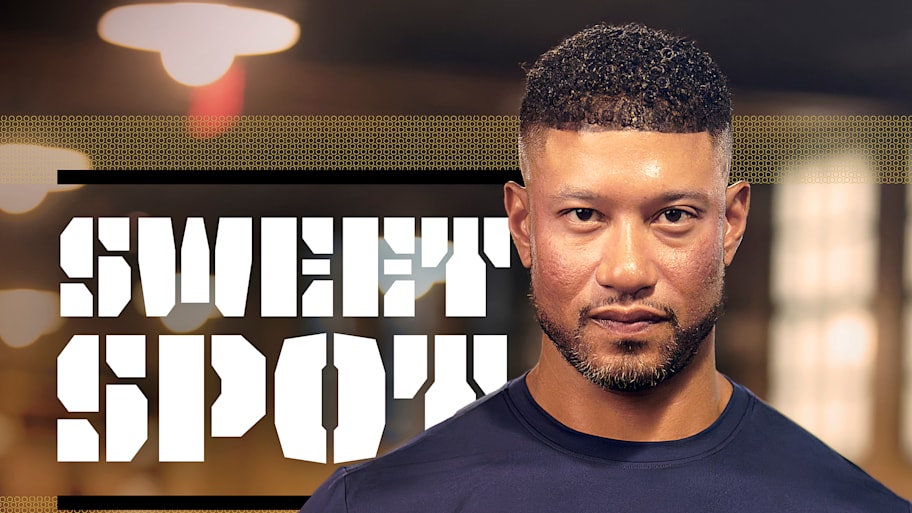
But he also keeps his feet moving, because even a brief pause elevates the risk of getting stuck and wasting time. There is only so much of it in a day when you’re chasing national championships and helping raise six children.
“That’s tonight?” Freeman asks associate athletic director Katy Lonergan, when reminded of a function he’s committed to attend.
“Yes, 7:30,” Lonergan says.
A brief spasm of surprise, maybe tinged with panic, crosses his face. Then it’s gone—he’ll be ready to speak. He’s seamlessly back to the task at hand, agreeably striking poses in the historic interior of a stadium that has been home to Rockne, Leahy, Parseghian, Holtz—and Kelly. It’s his home now, and he’s not renting. He owns it.
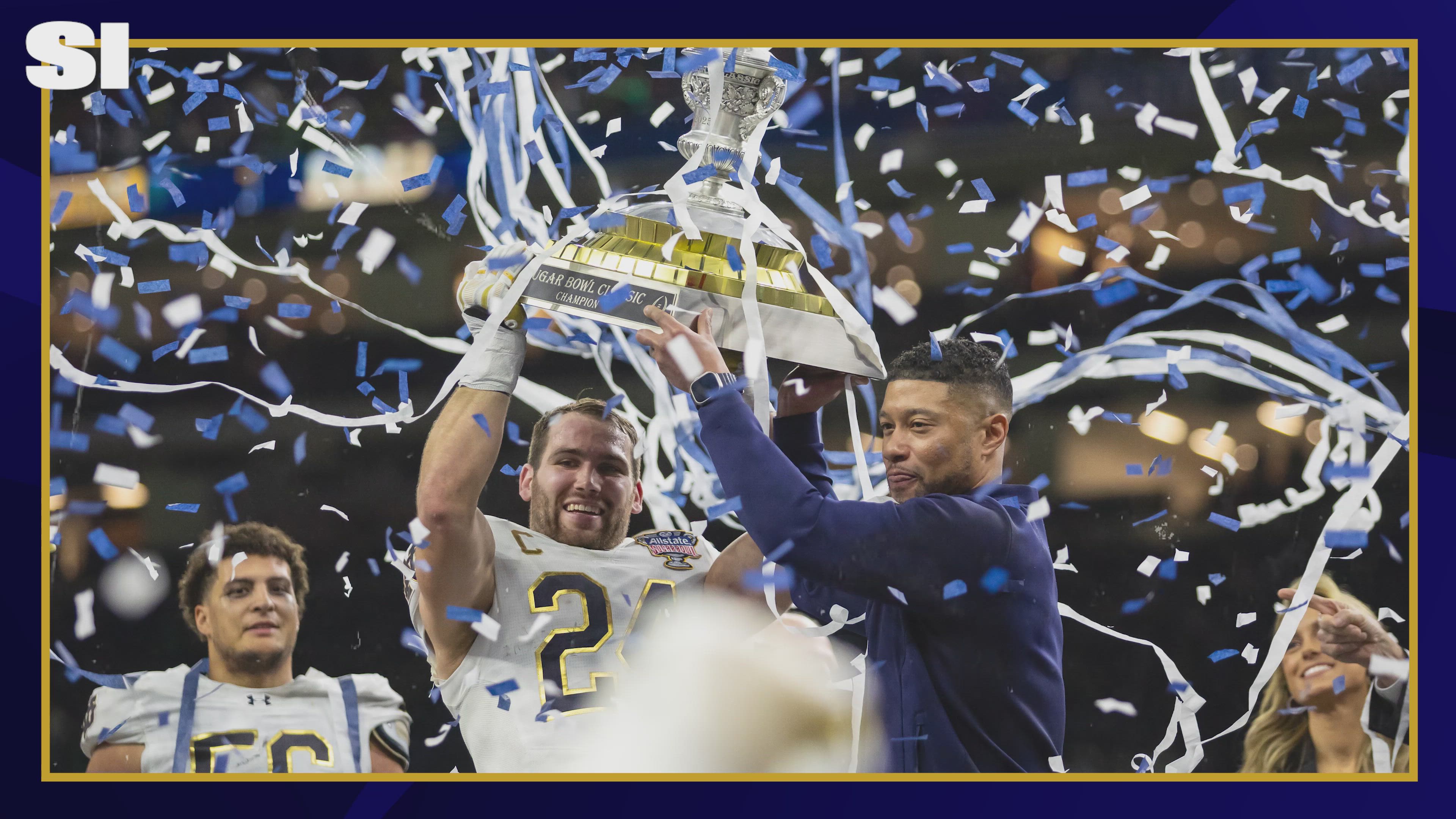
Jack Swarbrick guides his SUV into the gravel parking lot of The Workingman’s Friend, a cash-only burger joint in Indianapolis that does right by its blue-collar name. He turns off the Pink Floyd playing on his radio, heads inside and orders a double cheeseburger with a load of fries. Over the racket of the lunch crowd, the retired Notre Dame athletic director, now 71, explains why he shocked the college football world in late 2021.
“I love risky stuff,” he says.
When the blueblood coaching carousel stopped that December, Lincoln Riley had gone from Oklahoma to USC, replaced by longtime Clemson assistant Brent Venables. Kelly had left South Bend for LSU, and Freeman moved up the ladder at Notre Dame. Of those four hires, one was considered a much bigger leap of faith than the other three. Riley and Kelly had been to the College Football Playoff. Venables had spent the entire 21st century as a star defensive coordinator and was overdue for his shot as a head coach.
Freeman? He was 35, just a decade into his coaching career, with only five seasons as a coordinator. That guy was going to follow the winningest and longest-tenured coach in Notre Dame history? That guy was the choice over Luke Fickell, Freeman’s former boss at Cincinnati, who was in the midst of a Cinderella CFP run? That guy was taking over at a school that had whiffed with Charlie Weis, Bob Davie and Gerry Faust—the last three men to lead the Irish with no college head-coaching experience?
Three seasons in, guess which one of those four hires has been the home run? The older, more proven coaches enter this season on seats of varying heat. Freeman is 33–10, better than the others (and Fickell, who took over at Wisconsin the following year) by winning percentage and by peak playoff performance. He’s the blast of freshness Notre Dame needed after the Kelly era. He’s coming off a 14–2 season and an appearance in the CFP championship game, having knocked off Georgia and Penn State in the first 12-team playoff, then rallying valiantly in the second half to extend heavily favored Ohio State for the full 60 minutes.
Thus Freeman fulfilled the third-year prophecy, which states that every highly successful Notre Dame football coach will win or play for a national title by his third season. Kelly did it in 2012, Lou Holtz did it in 1988, Dan Devine in ’77, Ara Parseghian in ’66, Frank Leahy in ’43. (Knute Rockne went 9–0 in both his second and third years, but there was no nationally recognized way of crowning a champion in 1919 and ’20.) The season was an emphatic validation of Swarbrick’s big risk.
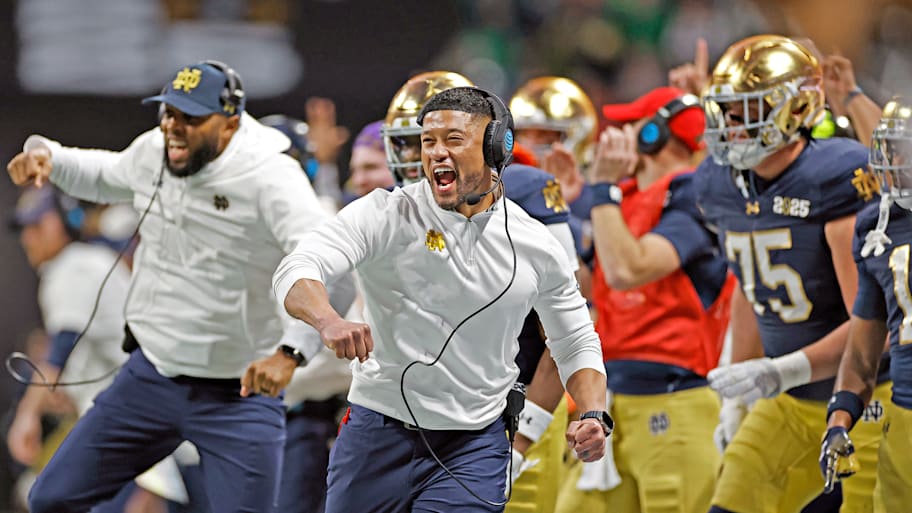
“When I thought about what we needed for this hire, the first two things on my list were culture building and recruiting,” Swarbrick says. “We never had any depth. Marcus has recruited and developed real depth. The culture thing then got reinforced when I met with the student-athletes and they said, ‘Don’t f--- this up. This is our culture. It’s not Brian Kelly’s.’
“So I’m in that headspace, and one of the most impactful comments I received from the student-athletes was Kyren Williams [now with the Rams] telling me, ‘Jack, I intentionally go through the building each day on the path I do so I can stop in and say hi to Marcus.’ Kyren is a running back and Marcus is a defensive coordinator.”
Former Irish linebacker Jack Kiser, now a rookie with the Jaguars, got to experience Freeman as a position coach, coordinator and head coach. He says the entire locker room wanted to see Freeman promoted.
“He’s his genuine self on a daily basis, which allows people to open up to him,” Kiser says. “It always felt like there was something about him challenging me, and you didn’t want to let him down. It didn’t feel like a transactional relationship.”
Swarbrick was well aware of the program’s history of futility hiring first-time college head coaches. But he also was influenced by the success Clemson had with Dabo Swinney, who was promoted from wide receivers coach without even having coordinator experience. Swinney’s culture building overrode his lack of experience, and he turned the Tigers into a powerhouse.
“The culture thing then got reinforced when I met with the student-athletes and they said, ‘Don’t f--- this up. This is our culture. It’s not Brian Kelly’s.’ ”Former Notre Dame AD Jack Swarbrick
Swarbrick compressed the job search into about four days. He holed up in his house with a core of administrators: senior associate athletic director for football Ron Powlus; senior associate athletic director Aaron Horvath; and Jenny Borg, an adviser to Swarbrick. His sights were set on Freeman. Eventually he went around the room and asked for reasons why he shouldn’t pick the DC.
Powlus, whose voice carried added weight as a four-year starting quarterback for the Irish and a former assistant coach, answered, “I don’t have any. He’s the right guy.” Everyone else agreed.
Two games into Freeman’s first season, they all appeared to be very wrong. Coming off a competitive loss at Ohio State, the Irish flopped in his home debut: a 26–21 loss to Marshall. The following month he lost at home to a 3–9 Stanford team. The Irish won nine games that year despite not having a high-level QB, but a pattern of forehead-slapping losses was established.
In Year 2, the forehead slapper was against a far better opponent—undefeated Ohio State—but in more painful fashion. Notre Dame was ahead 14–10 before surrendering a last-minute touchdown drive that was capped off by a ghastly gaffe: The Irish had only 10 defenders on the field for the final two plays at the goal line.
There was miscommunication (Notre Dame had two defensive calls that sounded similar; a pair of players heard different calls, and neither entered the game), and there was coaching failure (assistants in the press box and on the sideline weren’t counting bodies). Freeman took full responsibility and never named a player or coach publicly for the breakdown. Privately, he told his assistants they cannot watch a tense ending like fans; they have to keep their heads in the game.
The final slapping of the forehead looked like it might leave an indelible mark. The Irish followed a steely road victory over Texas A&M to open the 2024 season with an incomprehensible home loss to Northern Illinois, which went on to finish tied for sixth in the Mid-American Conference. At that point, more than a few people had come to the conclusion that Freeman was simply a nice guy who couldn’t hack it at a Notre Dame level.
He got supportive day-after phone calls from several people, including past and present administrators. But this was something Freeman had to shoulder himself. Then he had to pick up his entire program.
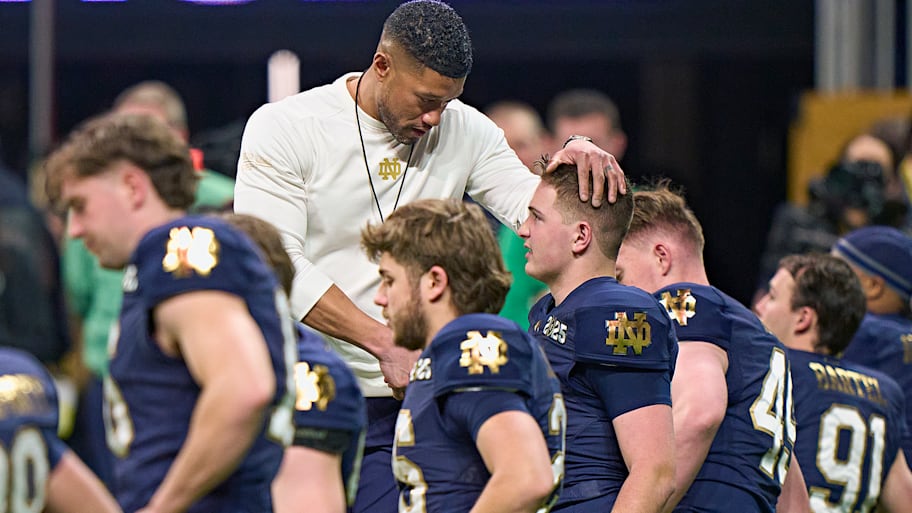
“It can be lonely, right?” Freeman says, sitting on a couch in his office. “You have to have a faith and a belief in yourself as a leader that it’s going to be O.K., even when your confidence is broken.”
That next morning, Freeman rallied himself by taking out a pen and a piece of paper. He wrote a letter he read aloud—first to his staff, then later to his entire team. Freeman gets up off the couch, goes to his desk and produces the letter. “I’ll keep this probably forever,” he says as he begins to read.
There is a reason we lost on Saturday. Our challenge is to figure out what the reason was. Yes, there are schematic things, but there is more to this lesson. We weren’t ready to handle success yet. Sometimes you have to lose to win. When a big win is on the horizon, usually a loss precedes it because there are lessons in losing that build the strength necessary to handle success. Delayed gratification equals patience plus strategy. Patience without strategy equals just waiting. We must do some things we haven’t done, personnel-wise and schematics, and do things better than we’ve ever done. We will be grateful for this loss. Right now, misery wants company. Some of this misery, we’re going to have to go through alone and take a hard look at ourselves, our units, our positions, and figure out where we fell short and how we can change it during that misery and eval. Just know that I believe we have the best coaches and players in the country to get it fixed. There is no reward without pain, no success without struggle. Not denied, just delayed.
Emotion flowed in the meeting room after Freeman read his letter to the team. (“Team meetings, that’s where the real gold is with him,” Kiser says.) Resolve set in. A wiser, stronger, more urgent group reeled off 13 straight victories, just two of them decided by single digits.
Delayed gratification equals patience plus strategy. Patience without strategy equals just waiting.From Marcus Freeman’s post-loss letter
Ahead of its CFP title-game run, Notre Dame did a remarkable thing for an institution that has always taken academics very seriously. It changed the entire fall semester final exam schedule to accommodate a possible home playoff game. Sure enough, the Irish made the playoff and hosted the first on-campus playoff game in college football history on Friday, Dec. 20, against Indiana.
That was, in some respects, a testament to Freeman’s sugar over Kelly’s salt. By all accounts, the new coach has been easier for the administration to work with than the old coach. “You’re not fighting with admissions,” says one administrative source from the athletic side of campus. “You’re not fighting with financial aid. They’re trying to help you. They changed the academic schedule for a game. I don’t think they would have done that with Brian Kelly.”
Through this three-year growth period, any doubts about Freeman were laid to rest. The young-coachlearning-on-the-job storyline had been stubbornly slow to dissolve to the point of being outright insulting.
Penn State’s James Franklin supplied the final diss. The head coaches’ joint press conference the day before the Nittany Lions and Fighting Irish met in the Orange Bowl turned into something of a Franklin filibuster and a condescending comedy act.
Franklin referred to Freeman throughout the press conference by his first name. Freeman, pillar of courtesy that he is, called his counterpart “Coach Franklin.” The 52-year-old Franklin asked Freeman how old he was (“Thirty-eight,” was Freeman’s terse response), then made a joke about Freeman’s head of hair, compared to his bald dome. For good measure, Franklin opined that Notre Dame, staunchly independent, should join a conference.
The look on Freeman’s face during the press conference made clear that he felt insulted. Notre Dame sources confirmed as much later. “I mean, he was furious,” one said. “And he used it with the team. He said, ‘These guys don’t respect you. Let me give you an example of how I know they don’t respect me.’ ”
Kiser says most of the players were aware of what transpired at the press conference via social media before Freeman returned to the team hotel. “The team was already feeling a certain type of way,” Kiser says. “And when Coach Freeman got back, you could tell there was an added chip on his shoulder. Essentially, [Franklin] was trying to big brother our coach. That was just spitting in our face. Respect your opponent.”
One night later, Freeman was 1–0 against Franklin. His team battled through a barrage of playoff injuries to become one of the last two standing in the longest postseason in college history. The only thing Notre Dame didn’t accomplish in an overachieving season was to end a national championship drought that has stretched to 37 years.
Few Fighting Irish fans left Atlanta after the loss to Ohio State feeling empty. But coaches and players are wired differently, and some elements of that game have gnawed at Freeman through the offseason: practicing in the morning instead of at night in the leadup to the game; the defensive call that gave Buckeyes phenom Jeremiah Smith one-on-one coverage for the deciding deep shot; and a play where Freeman acknowledges, “Chip Kelly got us.”
The play was Ohio State’s first touchdown, which the box score blandly records as a seven-yard pass to Smith from quarterback Will Howard. It was much more interesting than that. At the snap, Smith started a sprint across the back of the formation from right to left, then abruptly reversed course to take the pass in the flat and stroll in against a bamboozled Irish defense. It was a callback to a play Alabama used to score a touchdown against Ohio State in the 2020 CFP championship, but the real intrigue was the game inside the game.
Notre Dame’s scouting report said that every time Smith lined up with his outside foot forward, he would go across the formation, often completely crossing from one side of the field to the other. On the touchdown, Smith lined up with his inside foot forward, then switched it right before the snap. Cornerback Christian Gray alertly noticed and frantically signaled to his teammates exactly what the scouting report said, that Smith was going to cross the formation. At the snap Gray sprinted for the opposite side of the field, but Smith reversed into the flat and was wide open for a walk-in touchdown. Ohio State delivered a crusher of a tendency breaker. Notre Dame’s only fault on the play was being too aware of its own scout. “They got us,” Freeman says. “Good job by them.”
These are the thoughts Freeman has taken with him through the offseason. Finishing second is an accomplishment, but not the ultimate goal.
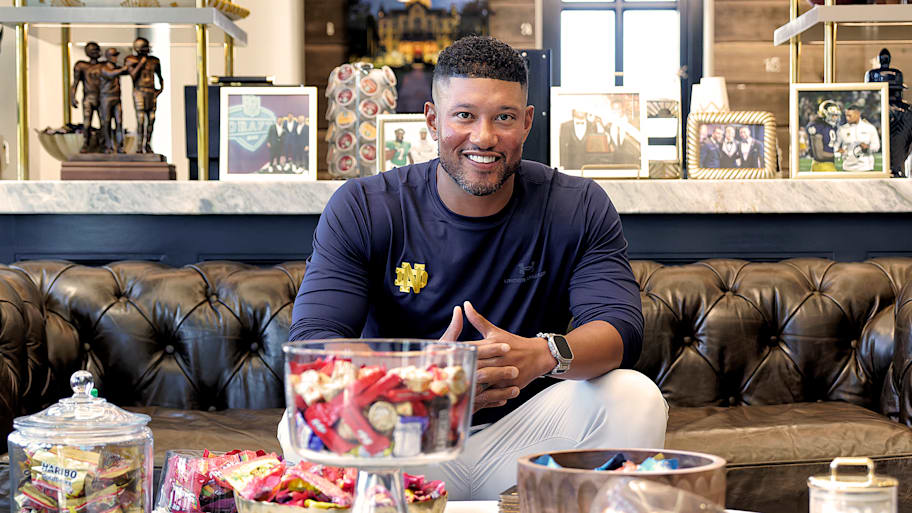
Last season did, at least, kill the young coach narrative, and Freeman has the wisps of gray in his facial hair to underscore that. But the hot NFL coach storyline has replaced it. Industry sources say Freeman has garnered interest, and the NFL could be Notre Dame’s only serious competition when it comes to keeping him in the fold for a long time. But before that even becomes a consideration, there is another title chase with another Top 10 team underway. Even with an inexperienced QB in sophomore CJ Carr, the Irish are viewed as a major contender. They have recruited elite talent and developed elite depth, as Freeman has thrown himself into every aspect of program building. “He is absolutely tireless,” says Irish athletic director Pete Bevacqua. “I joke that there must be multiple Marcus Freemans, because he seems to be everywhere at once. Just an amazing work ethic.”
Michael Freeman spent 26 years in the U.S. Air Force, which informed the methods he used in raising his sons, Michael Jr. and Marcus. Discipline, structure, hard work—those were pillars of the daily routine. Early every morning, the two half-asleep boys warmed up by running in place while their father finished his workout, then he put them through their own strength and conditioning regimen.
Sometimes, the boys (Michael Jr. is two years older) assumed their dad wasn’t paying attention and stopped running. He always saw them.
“Pick your feet up,” he’d bark.
Toughness was the tone and the teaching point. But there was another side to the old master sergeant, one that came out through his work with the Shriners in middle Ohio. Michael Freeman dressed up as a clown to entertain children.
To this day, Marcus has an affinity for clown masks—the scary kind, as opposed to the Bozo look his dad employed. At random moments around the house, he will leap out with one of the masks on to terrify his children, who range in age from senior in high school (Vinny, a wrestler, is headed to Cornell next year) to 6 years old.
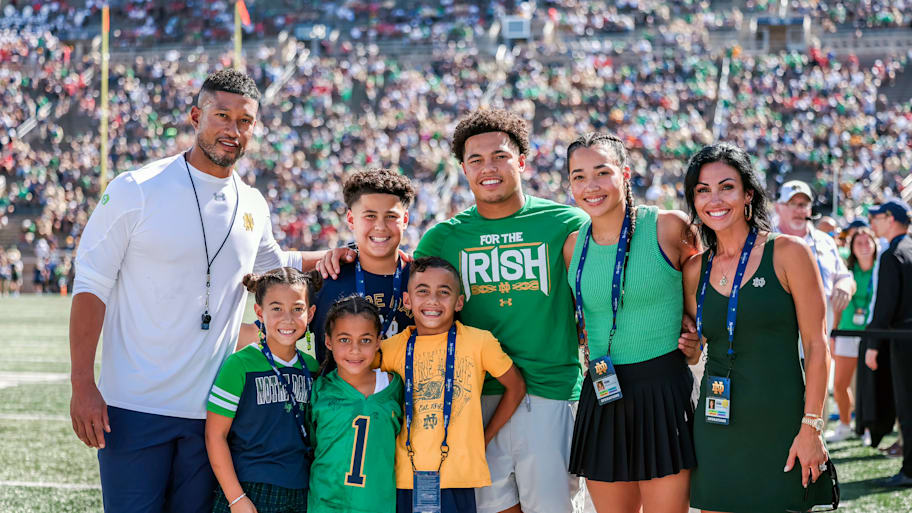
The man behind the mask is a pastiche of characteristics. He has the disciplined, taskmaster side instilled by his father—that’s the Marcus who wakes up early for his own workout every day, using that alone time to gather his thoughts while maintaining a physique similar to that of his days as a standout Ohio State linebacker. Like his dad, Marcus is an honest communicator, never avoiding difficult conversations.
He also has the nurturing, other-focused side that was cultivated by his mother, Chong, who met Michael when he was stationed in South Korea. Chong left her family and moved to the United States with Michael in 1976, not returning to her home country for 41 years. Marcus says she always worked two jobs, and sometimes added a night shift cleaning a business to her duties.
“We thought it was fun—we would go help Mom take out the trash and sweep,” Marcus recalls. “But now as an adult, I look back and go, ‘Oh man. How selfless was she?’ Every night, she would make an American dinner for us and then make a Korean meal for her. She’d take care of her family and then take care of herself. And I believe there’s a little bit of me that is like her, driven to empower the people in this place.”
One of Marcus’s proudest moments was accompanying Chong to a state dinner at the White House honoring the president of South Korea. Frequently cited as an accomplished “Black coach,” Freeman is always quick to point out his half-Korean heritage.
The third element of Freeman’s personality is the guy who loves scaring his kids in clown masks. Even now, working in a pressurized environment, he retains a knack for keeping things light whenever possible. Freeman enjoys a good amusement park thrill ride. He is a card-game enthusiast, challenging players or staffers on team flights to beat him in bourré, tonk, spades or euchre.
“He has an uncanny ability to relate to his players,” Bevacqua says. “They’re able to connect with him to create a culture where everyone has a role.”
And a visit to his office is, literally, akin to being a kid in a candy store. Seven jars of sweets adorned two tables in his office on a recent visit, everything from gummy candies to chocolate to Life Savers. Visitors are welcome to whatever they want. Freeman looks at all that candy every day and has none of it. “Helps me with mental toughness,” he says.
All he needs is the Keurig machine on a counter and the omnipresent Trident Vibes pack on his desk. Marcus Freeman keeps it minty fresh, always.
More College Football on Sports Illustrated
Listen to SI’s new college sports podcast, Others Receiving Votes, below or on Apple and Spotify. Watch the show on SI’s YouTube channel.
This article was originally published on www.si.com as How Marcus Freeman Won Over Notre Dame After Brian Kelly’s Salty Exit.
